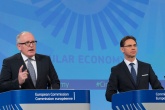European Parliament wants separate collection exemption removed
The European Parliament’s Environment Committee has today (2 June) released a draft report suggesting amendments to the Waste Framework Directive proposals set out in the Circular Economy Package (CEP) last year. Notable changes the committee is calling for include the removal of TEEP exemptions to the separate collection of materials, increased recycling targets and mandatory separate food waste collection.

Once the European Parliament has sealed its position, the package will go to trilogues involving the European Council, Parliament, and Commission to finalise the European position.
Removal of TEEP condition
Significantly, the document calls for the removal of the condition that separate waste collections only have to be performed when ‘technically, economically and environmentally practicable’ (TEEP). This means that paper, plastics, metals and glass, which many UK local authorities currently collect using co-mingled services, would have to be collected separately ‘Where necessary to comply with paragraph 1 [of the directive] and to facilitate or improve recovery’.
The removal of the conditions is justified in the report because: ‘The current wording for the obligations to establish separate waste collection systems for specific types of materials has produced widely differing results as regards its implementation in the different member states. Collection of pre-sorted waste is one of the tools supporting the creation of a high-quality recycling market and the attainment of high levels of recycling. The introduction of technical, environmental and financial limits has allowed numerous exemptions, rendering application of this principle impossible.’
Recycling targets
Among the amendments called for in the report is an increase of reuse and recycling targets for 2030 to 70 per cent of municipal solid waste and 80 per cent of packaging waste, as was set out in the first draft of the package in November 2014.
In July 2015, prior to the European Commission’s (EC) release of the revised CEP, MEPs strongly backed a resolution proposing these legally binding targets for all EU member states. These were reduced in the final package to 65 per cent and 75 per cent respectively, with Frans Timmermans, First Vice-President of the EC, suggesting that a 70 per cent target would not have been achievable.
Another aspect of the July 2015 resolution that the Environment Committee wishes to see included in the package is that calculation of recycled municipal waste should be based on one harmonised method, preventing member states from reporting discarded waste as recycled waste.
At an event in Brussels last week, Resource Association Chief Executive called for clarity in determining how recycling rates are calculated, saying that the CEP presents a “golden opportunity to end the confusion and discrepancies” that make current European recycling league tables “worthless”.
Biowaste
The report also sets out a desired target of ‘at least’ 65 per cent of biowaste to be recycled by 2025. The report says that such a target is necessary ‘to attract infrastructure investments towards recycling facilities for bio-waste and to boost markets for compost and digestate’.
In addition, it proposes making separate bio-waste collection obligatory (as called for last month by the UK’s Bio-based and Biodegradable Industries Association), removing the original condition that such systems only be set out ‘where technically, environmentally and economically practicable (TEEP) and appropriate’.
Bonafè has extended the call for separate collections to include wood and textiles in order to increase preparing for reuse and recycling rates in member states. Seperately collected waste, the report adds, should be subject to a ban on incineration.
Following on from legislation passed earlier this year in France, Bonafè’s report also proposes that member states should encourage the setting up of conventions enabling the food retail sector to distribute unsold products to charitable organisations, while the EC should present guidelines for food for donation including on fiscal and technical aspects.
The EU has committed to complying with the United Nation’s Sustainable Development Goal to reduce food waste by 50 per cent by 2030, and Bonafè says that to achieve that goal, member states should include an objective that is at least equivalent to this in their national waste prevention programmes.
Marine litter
Marine litter pollution is an issue that has gained increased attention in the past year, with one Ellen MacArthur Foundation report claiming that by 2050 the sea could contain more plastic (by weight) than fish.
The European Parliament report brings new focus on marine litter in its amendments suggesting that member states should adopt measures to reduce land-based litter that is likely to end up in the marine environment and in particular aim at achieving the target of reducing marine litter by 50 per cent by 2030.

The report reads: ‘Most marine litter comes from land-based activities and is caused by poor waste management practices. That is why member states should adopt measures to reduce land-based litter that is likely to end up in the sea… Member states should include marine litter reduction targets that are at least equivalent to this [50 per cent target] in their national waste prevention programmes.’
Among the other proposals included in Bonafè’s report are:
- Targets for commercial and industrial waste for 2025 and 2030 to be established by the EC by the end of 2018;
- A 50 per cent reduction of land-based litter by 2030, with producers of products that are likely to become litter promoting the provision of information on sustainable product use and the use of education programmes for citizens, and the discouraging of the marketing and the use of single-use products;
- Member states should set up national municipal waste reduction targets to ensure that at least the total union municipal waste generation per capita is reduced by five per cent by 2025, compared to the 2014 baseline, and by 10 per cent by 2030. Member states above the average should undertake significant efforts.
- The EC should propose, by the end of 2018, a lead indicator and a dashboard of sub-indicators on resource efficiency to monitor the progress towards the target of increasing resource efficiency at union level by 30 per cent by 2030 compared with 2014 levels.
- A three-yearly EC report should be made on the progress achieved in reaching recycling targets and in the implementation of the directive’s obligations.
Reuse
One of the main criticisms surrounding the package proposed in December was that it focused too much on waste recycling, with not enough action proposed to increase reuse. In a comment written for Resource, Michal Len, Director of RREUSE, an organisation representing European social enterprises promoting reuse, repair and recycling, said: ‘Despite a new proposed methodology, there is no legally-binding separate target for preparation for reuse, only encouragement for member states that want to do this. It’s vitally important that preparation for reuse becomes a clear part of the legal framework, and is not left as an afterthought for voluntary action.’
The report released by Bonafè today suggests no changes to this, and the European Environmental Bureau (EEB), a non-governmental organisation that represents environmental organisations from different member states and aims to influence EU policymaking accordingly, stated that having a single target for recycling confuses waste that can be recycled with waste that can be reused. To this end, it called for two separate targets to be established to get the most value out of each. Friends of the Earth Europe (FOEE) has also questioned the lack of a separate reuse target in the amendments.
Concrete waste prevention measures lacking
In general, FOEE said, the amendments send ‘a strong signal’ to the EC ‘that Europe’s waste legislation needs to be more ambitious’.
In a response to the report today, the organisation wrote: ‘We welcome the steps taken to ensure the separate collection of biowaste and the reduction in incineration, yet there is still room for improvement. The key to a true circular economy lies in preventing waste being created in the first place, and we need binding targets in this area.’
‘Bonafè’s report lacks concrete targets on waste prevention – binding targets to reduce the total amount of waste generated are crucial to address our overconsumption crisis and reduce resource use.
‘[We are also] missing is a binding EU-specific target on food waste, not just an aspirational one. Around 30 per cent of the world’s agricultural land area is lost due to global food waste – it is unjust and unsustainable for European decision-makers not to play their part in reducing this.’
Target allowances for poorly performing member states criticised
The organisation also questions the lack of amendments to the time extensions that some member states will be given to meet the targets set out in the package.
Under the proposals, member states that recycled less than 20 per cent of their municipal waste in 2013 may request an additional five years for the attainment of the 2025 target of 60 per cent, while states that recycle at least 50 per cent of municipal waste by 2025 (instead of the proposed 60 per cent) may request an additional five years for the 2030 target (65 per cent in the EC’s proposal).
The FOEE says that ‘the proposal for granting extensions… remains a mess and will not help member states effectively move towards a circular economy’. It states: ‘We need to reward countries who consume less and generate less waste, by granting derogations only for those that send a small weight of waste per capita going to landfill and incineration.’
The EEB agrees, stating: ‘This will only widen the gap between countries with advanced waste policies and those lagging behind. Derogation should be based on something else, for example on the total waste generated (below [a] certain cap) or residual waste generated (below a certain cap).’
Harmonised recycling rate calculation welcomed
The Resource Association has welcomed the ambition indicated by many proposed amendments to the Commission’s initial proposals as a necessary and important contribution to the debate. Chief Executive Ray Georgeson said: “I am pleased to see a clear position from the European Parliament Environment Committee in relation to the harmonisation of recycling rate calculation methodology as described in their Amendment 21. This amendment clearly marks out a desire to see the reporting of discarded waste as recycled waste prevented and states clearly the desire to settle on point of input to final recycling process as the correct point of measurement. We warmly welcome this.”
“In addition, it will be interesting to see the emerging debate about Amendment 109 that proposes the removal of the TEEP restrictions in the existing Article 11 provisions. The justification statement from the Committee is telling: ‘The introduction of technical, environmental and financial limits has allowed numerous exemptions, rendering application of this principle impossible’. We concur with this view and look forward to the next level of debate about this important element in the delivery of the circular economy – the best ways to provide consistent high-quality materials to manufacturers and reprocessors, especially in the context of the move in England to encourage local authorities towards greater consistency in household recycling collections.”
The full draft report can be downloaded from the European Parliament website.








